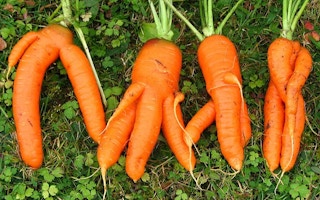A new survey showed Singaporeans eat with their eyes first, and so, misshapen, bruised, or discoloured fruits and vegetables do not appeal to their palates.
But this ‘ugly food’ rejection is contributing to mounting food waste — as much as 785,500 tonnes of food was wasted in the city-state in 2015, roughly the equivalent to the weight of 108 full-load double decker buses in a day. Authorities are calling for a change in mindset to curb this unhealthy habit.
Last month, household appliance brand Electrolux surveyed 1,000 Singaporeans on their buying and eating behaviours. Of those surveyed, 52 per cent admitted they would rather throw away ‘ugly food’ instead of eating them, even if they knew this contributes to food waste.
A hefty 83 per cent of those surveyed said they prefer to buy fresh-looking fruits and vegetables, and one in four admitted they would never eat misshapen, discoloured or bruised fruits and vegetables.
Awareness of the severity of food waste problem in the country did not seem a compelling reason for people to think twice about wasting food, with 61 per cent of respondents saying they were aware of the food waste problem, but one in five saying they did not care.
The number of respondents who were indifferent to food waste rose to one in four for those aged between 18 and 24, and more males (21 per cent) were indifferent compared with females (16 per cent).
Singaporeans who responded to the survey did say ugly food waste made them feel sad (44 per cent), guilty (37 per cent) and shocked (26 per cent).
“
Ugly food is one of the contributing factors to food waste that has not been widely explored and discussed. It is time for us to take an active stand on reducing food waste from all stages of the food supply chain cycle.
Nichol Ng, chief food officer, The Food Bank Singapore
All hope is not lost, however, as 65 per cent of those surveyed said they will use ugly food in their daily meals if these were sold at a lower price compared with perfect-looking food.
This year’s Ugly Food survey is part of the continuing #happyplateSG campaign, first launched last year.
Considering that nearly half of the total fruits and vegetables harvested – a staggering 46 per cent – never make it from farm to fork in Singapore, #happyplateSG invites Singaporeans to value ugly food and include it into their daily meal purchases, promoting the idea that #UglyIsTheNewGood and that food doesn’t need to look postcard-pretty to be nutritious and delicious.
When ugly food makes it from farm to fork, this will help reduce food waste from the beginning of the food chain, ugly food proponents say.
Electrolux Major Appliances Asia Pacific president and CEO Kenneth Ng said. “This year, we decided to focus on ugly food in Singapore because 46 per cent of fruits and vegetables never make it from farm to fork as they are not the right shape or colour. We want to raise awareness among the general public to embrace ugly food…[which] can taste just as good as perfect-looking food and is as nutritious.”
Electrolux is harnessing the power of social media to spread awareness on the ugly food campaign, launching photo contests online and calling participants to post pictures of how ugly food was prepared and served into appealling and delicious meals.
The social media contest also involves social sharing of the hashtags #UglyIsTheNewGood and #happyplateSG. With every eight hashtag shares, Electrolux will fund The Food Bank Singapore’s Fresh Food Truck for one day.
The Food Bank Singapore collects and distributes excess perishable food items to families most in need across Singapore.
“Our long-term partnership with The Food Bank Singapore ensures that we continue to provide sustainable solutions to the local community – reducing food waste and ensuring the needy gets to benefit from our efforts,” said Douglas Chua, general manager of Electrolux Singapore.
The Food Bank Singapore’s chief food officer Nichol Ng said: “Ugly food is one of contributing factors to food waste that has not been widely explored and discussed. It is time for us to take an active stand on reducing food waste from all stages of the food supply chain cycle.
More information on how to participate in this initiative can be found at www.happyplate.sg

















